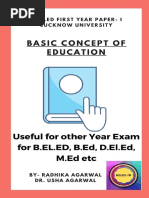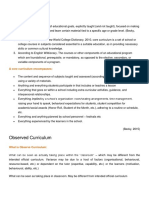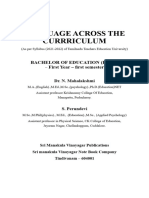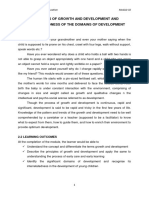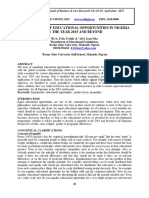0 ratings0% found this document useful (0 votes)
160 viewsGandhi and John
Gandhi and John
Uploaded by
Ayush GuptaCopyright:
© All Rights Reserved
Available Formats
Download as PDF, TXT or read online from Scribd
Gandhi and John
Gandhi and John
Uploaded by
Ayush Gupta0 ratings0% found this document useful (0 votes)
160 views6 pagesOriginal Title
gandhi and john
Copyright
© © All Rights Reserved
Available Formats
PDF, TXT or read online from Scribd
Share this document
Did you find this document useful?
Is this content inappropriate?
Copyright:
© All Rights Reserved
Available Formats
Download as PDF, TXT or read online from Scribd
Download as pdf or txt
0 ratings0% found this document useful (0 votes)
160 views6 pagesGandhi and John
Gandhi and John
Uploaded by
Ayush GuptaCopyright:
© All Rights Reserved
Available Formats
Download as PDF, TXT or read online from Scribd
Download as pdf or txt
You are on page 1of 6
Q.
make a camparative analysis of educational ideas of
mahatma gandhi and john dewey who do you consider
suitable in the 21st century and why?
Introduction- Mahatma Gandhi and John Dewey were two
influential educational philosophers of the 20th century who had
differing perspectives on the nature and purpose of education.
However, both shared a belief that education should be geared
towards the holistic development of the individual, with a focus
on self-realization and social responsibility. Gandhi emphasized
self-discipline, self-reliance, and social responsibility in his
educational philosophy, while Dewey prioritized experiential
learning, problem-solving, and active citizenship. Their ideas
have had a significant impact on education systems worldwide,
and continue to inspire educators and scholars today.
Both Mahatma Gandhi and John Dewey have educational
ideas that are still relevant and valuable in the 21st century.
However, in terms of which is more suitable, it may depend on
the specific context and goals of the education system.
Gandhi's emphasis on self-reliance, social responsibility, and a
holistic education is still important in today's world, especially
as we face issues related to sustainability and social justice.
Additionally, his emphasis on experiential learning and the
importance of character development align with many
contemporary educational philosophies.
Dewey's emphasis on experiential learning, critical thinking,
and active citizenship is also highly relevant in the 21st century,
especially as we navigate a rapidly changing world where
adaptability and creativity are highly valued. His emphasis on
learning through experience and problem-solving align with the
needs of a global economy that prioritizes innovation and
adaptability.
Educational ideas of mahatma gandhi
Mahatma Gandhi had a unique and influential vision for
education that was grounded in his philosophy of self-reliance,
social responsibility, and the creation of a self-sufficient Indian
society. Some of his key educational ideas include:
1. Emphasis on character development: Gandhi believed that the
purpose of education was to develop the whole person, with an
emphasis on moral and character development. He believed
that students should be educated not only in academic
subjects, but also in ethical and spiritual principles.
2. Focus on experiential learning: Gandhi believed that learning
should take place through practical experience and hands-on
work, rather than just through abstract academic study.
3. Emphasis on self-reliance: Gandhi believed that education
should enable individuals to be self-reliant and to contribute to
their own communities. He advocated for the promotion of
vocational education and skill development.
4. Education for social responsibility: Gandhi believed that
education should prepare students to be socially responsible
citizens who actively contribute to the betterment of society. He
believed that students should be educated in ways that enable
them to serve their community and promote social justice.
Overall, Gandhi's educational ideas emphasized the
importance of education as a tool for social transformation and
the cultivation of ethical and responsible individuals. His ideas
continue to inspire educators around the world to this day.
Educational ideas of john dewey
John Dewey was a prominent educational philosopher who
believed that education should prepare individuals for active
participation in a democratic society. Some of his key
educational ideas include:
1. Experiential learning: Dewey believed that learning should be
based on experiences and experimentation, rather than just the
memorization of facts. He believed that students should learn
by doing and by engaging with real-world problems and
challenges.
2. Critical thinking: Dewey believed that education should foster
critical thinking and problem-solving skills. He believed that
students should be taught how to analyze and evaluate
information, and how to use that information to make informed
decisions.
3. Education for democracy: Dewey believed that education
should prepare individuals to participate actively in democratic
societies. He believed that students should learn about
democratic values and principles, and should be taught to think
critically about the issues facing their communities.
4. Social learning: Dewey believed that learning should take place
in a social context, with an emphasis on collaboration,
communication, and the sharing of ideas.
Overall, Dewey's educational ideas emphasized the importance
of experiential learning, critical thinking, and the development of
democratic citizenship. His ideas have had a significant impact
on educational theory and practice, and continue to influence
educators around the world.
camparative analysis of educational ideas of mahatma
gandhi and john dewey
Mahatma Gandhi and John Dewey had differing perspectives
on the nature and purpose of education, but both shared a
belief that education should be geared towards the holistic
development of the individual and should promote social
responsibility. Here is a comparative analysis of some of their
key educational ideas:
1. Focus on Experiential Learning: Both Gandhi and Dewey
emphasized the importance of learning through experience.
However, while Gandhi believed that learning should be based
on practical work and hands-on experience, Dewey believed
that learning should involve active engagement with real-world
problems.
2. Emphasis on Social Responsibility: Both Gandhi and Dewey
believed that education should prepare individuals to be
socially responsible citizens. However, while Gandhi believed
that students should be educated in ways that enable them to
serve their community and promote social justice, Dewey
believed that students should learn about democratic values
and principles and should be taught to think critically about the
issues facing their communities.
3. Character Development: Gandhi emphasized the importance of
character development and believed that education should be
geared towards the cultivation of ethical and spiritual principles.
In contrast, while Dewey also believed that education should
foster moral and ethical development, he focused more on the
development of critical thinking and problem-solving skills.
4. Self-Reliance: Gandhi believed that education should enable
individuals to be self-reliant and to contribute to their own
communities, while Dewey believed that education should
prepare individuals for active participation in a democratic
society.
Overall, both Gandhi and Dewey's educational ideas have
important insights to offer in shaping modern education.
Gandhi's ideas emphasize the importance of character
development and self-reliance, while Dewey's ideas prioritize
experiential learning, critical thinking, and democratic
citizenship. Educators and leaders can draw from both
perspectives to create a comprehensive and effective
educational system that addresses the needs of today's
learners.
suitable in the 21st century
Mahatma Gandhi and John Dewey's educational ideas have
continued to influence educational practice and policy, but the
question of which philosopher is more suitable for the 21st
century remains an important one. In my view, John Dewey's
ideas are more suitable for modern education due to several
reasons.
Firstly, Dewey's emphasis on experiential learning and critical
thinking aligns with the needs of the 21st century. The modern
world is characterized by rapid technological advancements,
complex global issues, and an ever-changing job market.
Students need to be equipped with the skills to navigate this
complex landscape and to solve complex problems.
Experiential learning that allows students to learn through
practical experiences and critical thinking that encourages
students to analyze and evaluate information are key skills
needed for success in the 21st century.
Secondly, Dewey's emphasis on social learning and democratic
citizenship aligns with the growing importance of civic
engagement, social justice, and collaboration in the modern
world. As we face global challenges such as climate change
and social inequality, it is essential that students are taught to
think critically and creatively about how to address these
issues. Dewey's ideas on the importance of collaboration and
communication also align with the importance of teamwork and
social skills in today's workplaces.
Lastly, Dewey's ideas on the importance of lifelong learning
and adaptability align with the changing nature of work and the
need for individuals to continuously update their skills. With the
rise of automation and artificial intelligence, it is more important
than ever that individuals possess the ability to learn and adapt
to new technologies and work environments.
while both Mahatma Gandhi and John Dewey's ideas have
important insights to offer, Dewey's ideas align more closely
with the needs of 21st century education. His emphasis on
experiential learning, critical thinking, social learning, and
preparation for active democratic citizenship are particularly
relevant in the modern world. By drawing from Dewey's ideas,
educators can better equip students with the skills and
knowledge needed to succeed in the 21st century.
Conclusion
In conclusion, it is important to recognize the significant
contributions made by both Mahatma Gandhi and John Dewey
in the field of education. While Gandhi's ideas of basic
education and character development continue to influence
educational practice in India, Dewey's emphasis on experiential
learning, critical thinking, and social learning are particularly
relevant to the rapidly changing and complex global landscape
of the 21st century.
In order to meet the demands of the 21st century, educators
must draw upon Dewey's ideas to equip students with the skills
and knowledge necessary for success. By emphasizing
collaboration, civic engagement, and lifelong learning, Dewey's
ideas offer a valuable framework for creating educational
experiences that will prepare students for the challenges of the
modern world. Ultimately, incorporating Dewey's ideas into
educational practice can help ensure that students are
equipped with the skills and knowledge needed to succeed in
the 21st century.
You might also like
- WebpdfDocument296 pagesWebpdfNika MaglaperidzeNo ratings yet
- Unit 2 Social InstitutionDocument48 pagesUnit 2 Social InstitutionyaqoobmdNo ratings yet
- Result - Bteevaluation.co - in Odd Semester Main Result - Aspx Roll No E18220633000026Document1 pageResult - Bteevaluation.co - in Odd Semester Main Result - Aspx Roll No E18220633000026Shiksha Srivastava0% (1)
- Means of EducationDocument8 pagesMeans of Educationmahu007No ratings yet
- Phylosophy of EducationDocument3 pagesPhylosophy of EducationStogul OlgaNo ratings yet
- Comparism of Objective of Social Studies of Nigeria and GhanaDocument3 pagesComparism of Objective of Social Studies of Nigeria and Ghanakyrian chimaNo ratings yet
- Characteristics of Early AdolescentsDocument16 pagesCharacteristics of Early AdolescentsKrista Blackburn100% (1)
- Guidance and Counseling in Schools TopicDocument19 pagesGuidance and Counseling in Schools TopicUrooj ImranNo ratings yet
- Holistic Multidisciplinary EducationDocument20 pagesHolistic Multidisciplinary Educationdivya sudhanNo ratings yet
- EDU 411 - Curriculum and Instruction 2 (ALL LECTURES)Document18 pagesEDU 411 - Curriculum and Instruction 2 (ALL LECTURES)sedulousgraceNo ratings yet
- Educational ImplicationsDocument9 pagesEducational ImplicationshinaNo ratings yet
- B Ed SEHI-C16Document122 pagesB Ed SEHI-C16lata chalasaniNo ratings yet
- B.el - Ed First Year Basic Concep - Radhika AgarwalDocument306 pagesB.el - Ed First Year Basic Concep - Radhika AgarwalManu JainNo ratings yet
- Ant Bhala To Sab BhalaDocument8 pagesAnt Bhala To Sab BhalaAslam KhanNo ratings yet
- Agencies of EducationDocument20 pagesAgencies of EducationSanjeevNo ratings yet
- Development of Population Education in IndiaDocument13 pagesDevelopment of Population Education in IndiaDr. Nisanth.P.MNo ratings yet
- History Philosophy of EducationDocument26 pagesHistory Philosophy of Educationather siddiqiNo ratings yet
- Curriculum Development Contributors John Dewey: Tehseen Elahi Kashif RehmanDocument10 pagesCurriculum Development Contributors John Dewey: Tehseen Elahi Kashif RehmankashifNo ratings yet
- National Assessment and Accreditation Council (NAAC)Document4 pagesNational Assessment and Accreditation Council (NAAC)abhi0704No ratings yet
- (Psy 4) Ch-4 Question BankDocument3 pages(Psy 4) Ch-4 Question BankVraj M BarotNo ratings yet
- Nature and Scope of EducationDocument3 pagesNature and Scope of EducationAL-FAROOQ SCHOOLNo ratings yet
- Growth and DevelopmentDocument144 pagesGrowth and DevelopmentRanjana SharmaNo ratings yet
- The Humanistic Learning Theory Was Developed by Abraham MaslowDocument1 pageThe Humanistic Learning Theory Was Developed by Abraham MaslowHemala A/P VeerasingamNo ratings yet
- Aims, Concepts, Phylosophies-DevikaDocument36 pagesAims, Concepts, Phylosophies-Devikadivya100% (2)
- Content: National Plan of Action For Children 2005 Integrated Child Development Services (Icds) SchemeDocument21 pagesContent: National Plan of Action For Children 2005 Integrated Child Development Services (Icds) Schemecoreguys2010No ratings yet
- EDUCATIONAL GUIDANCE by HadiaDocument7 pagesEDUCATIONAL GUIDANCE by HadiaHadya HassNo ratings yet
- Our Visit To The Sneha Jyothi Special SchoolDocument5 pagesOur Visit To The Sneha Jyothi Special SchoolAshar MohaniNo ratings yet
- Assignment AutonomyDocument6 pagesAssignment AutonomySouvik MukherjeeNo ratings yet
- Education and Social ChangeDocument1 pageEducation and Social ChangesanamaqboolNo ratings yet
- Bangladesh Education Commission Report 1974Document309 pagesBangladesh Education Commission Report 1974Online SchoolNo ratings yet
- Late Childhood (Middle Childhood) : Ashish Kafle PGD in Psychological Counseling Trichandra Multiple CampusDocument30 pagesLate Childhood (Middle Childhood) : Ashish Kafle PGD in Psychological Counseling Trichandra Multiple Campusbikash shahNo ratings yet
- Concept of Quality in EducationDocument17 pagesConcept of Quality in Educationkomal kashyapNo ratings yet
- National Knowledge CommisonnDocument36 pagesNational Knowledge CommisonnKaran TalwarNo ratings yet
- Nature of Educational SociologyDocument1 pageNature of Educational SociologyRoxel Faith RicoNo ratings yet
- Implications For Education Using Frueds TheoryDocument4 pagesImplications For Education Using Frueds TheoryJonacel Aira LabitaNo ratings yet
- Core CurriculumDocument1 pageCore CurriculumZda HanNo ratings yet
- Aims and Objectives of Educ.Document2 pagesAims and Objectives of Educ.SarahJaneDanqueNo ratings yet
- Growth and Development PDFDocument12 pagesGrowth and Development PDFAkshay100% (1)
- Segregation Vs Integration Vs InclusionDocument10 pagesSegregation Vs Integration Vs InclusionMahnoor FatimaNo ratings yet
- Meaning, Nature and Scope of Curriculum, Relationship Between Curriculum and SyllabiDocument9 pagesMeaning, Nature and Scope of Curriculum, Relationship Between Curriculum and SyllabiafeeNo ratings yet
- Factors Influencing LearningDocument17 pagesFactors Influencing Learningnirajan shresthaNo ratings yet
- Theories of LearningDocument32 pagesTheories of LearningJoel Sempijja100% (1)
- Language Across The Currriculum - English - For PrintingDocument216 pagesLanguage Across The Currriculum - English - For PrintingPriyadharsinee jayakumarNo ratings yet
- National Evaluation Report - KGBV - 12 Dec 2013Document56 pagesNational Evaluation Report - KGBV - 12 Dec 2013Vikas Misra100% (2)
- Erikson's Theory of Psychosocial DevelopmentDocument3 pagesErikson's Theory of Psychosocial Developmentgmahanti100% (3)
- Wbuttepa Bed Guide LineDocument13 pagesWbuttepa Bed Guide Linebareh jamesNo ratings yet
- Distance Education in NursingDocument4 pagesDistance Education in NursingShubha JeniferNo ratings yet
- Islam and Its Educational ImplicationsDocument27 pagesIslam and Its Educational ImplicationsAjdina Batalović KrdžalićNo ratings yet
- Characteristic Features of Physical DevelopmentDocument2 pagesCharacteristic Features of Physical DevelopmentMuhammad Ather SiddiqiNo ratings yet
- Rights of Child: Binaljoshi Assistant Professor Child Health NursingDocument13 pagesRights of Child: Binaljoshi Assistant Professor Child Health NursingBinal Joshi100% (1)
- Difference Between Growth and DevelopmentDocument1 pageDifference Between Growth and DevelopmentMushtaq KhaskheliNo ratings yet
- Study of Stress and Parental Pressure in High School Students With Special Refference To Kerala Schools 1349Document5 pagesStudy of Stress and Parental Pressure in High School Students With Special Refference To Kerala Schools 1349Phúc TokyoNo ratings yet
- School and Society All ChapterDocument104 pagesSchool and Society All Chaptersuraasefa5No ratings yet
- Edu 1 Meaning, Definition, Aims, FunctionsDocument74 pagesEdu 1 Meaning, Definition, Aims, FunctionsShijiThomas100% (1)
- EDU 111 - BSMathEd - 1BDocument4 pagesEDU 111 - BSMathEd - 1BHines HubahibNo ratings yet
- 12 ConclusionDocument30 pages12 Conclusionbittu kumarNo ratings yet
- Principles of Growth & DevelopmentDocument10 pagesPrinciples of Growth & DevelopmentshylajaNo ratings yet
- Equality of Educational OpportunityDocument7 pagesEquality of Educational OpportunityjuliusNo ratings yet
- Kannada PDFDocument57 pagesKannada PDFchinmayeechinnu818No ratings yet
- 754 Ed71 Ass 1Document7 pages754 Ed71 Ass 1Nchimunya Guy- ScottNo ratings yet
- Written AssignmentDocument6 pagesWritten AssignmentdoraNo ratings yet
- Evaluate MOD4Document2 pagesEvaluate MOD4Br. Henry FSCNo ratings yet
- Edited - Listening Strategies Recovered - 1Document30 pagesEdited - Listening Strategies Recovered - 1TEPORA Johnhael JeoulsNo ratings yet
- Chapter Three NellyDocument4 pagesChapter Three NellyDONEKE MIRACLENo ratings yet
- TC Unit 4 One Shot Notes - Dbbaad72 4e52 4027 Ad43 8e19c4d7ce0fDocument32 pagesTC Unit 4 One Shot Notes - Dbbaad72 4e52 4027 Ad43 8e19c4d7ce0fdevshama110No ratings yet
- DR Martin Luther King JR Biography EssayDocument2 pagesDR Martin Luther King JR Biography EssayafabkgdduNo ratings yet
- Answer: B. Making A Machine Intelligent. Explanation: Artificial Intelligence Is A Branch of Computer Science, Which Aims ToDocument101 pagesAnswer: B. Making A Machine Intelligent. Explanation: Artificial Intelligence Is A Branch of Computer Science, Which Aims ToAbhishek A. NadgireNo ratings yet
- Perdev Week 1&2Document10 pagesPerdev Week 1&2Joy Rose CuaresmaNo ratings yet
- Students' Performance and Misconception in Metric Conversion: A Case StudyDocument8 pagesStudents' Performance and Misconception in Metric Conversion: A Case StudyAryan Jean C. FeudoNo ratings yet
- Sociology of BrandingDocument4 pagesSociology of BrandingTomas UribeNo ratings yet
- U.t-1 Date Sheet 2024-25Document1 pageU.t-1 Date Sheet 2024-25raparthisarala12No ratings yet
- Classical Sociological Theory 7th Edition Ritzer Test BankDocument13 pagesClassical Sociological Theory 7th Edition Ritzer Test Bankalbertchavezwbkafcgrns100% (43)
- Citizenship and Identity PDFDocument344 pagesCitizenship and Identity PDFBegoña100% (1)
- A. Discuss The Different Types of AgentsDocument4 pagesA. Discuss The Different Types of AgentsKhim AbualasNo ratings yet
- Kids and SportDocument1 pageKids and Sportomar halloumiNo ratings yet
- Grade 10 Booklist 2024-2025Document2 pagesGrade 10 Booklist 2024-2025rohaanshakir5No ratings yet
- Research Paper Format 2023Document15 pagesResearch Paper Format 2023Timothy Louisse Allen LizardoNo ratings yet
- CDE Model: Description of CDDocument5 pagesCDE Model: Description of CDcao.heng.caoNo ratings yet
- RIZALDocument3 pagesRIZALRonald SarmientoNo ratings yet
- PPST Domain 2 ReportDocument15 pagesPPST Domain 2 ReportTintin Francisco100% (1)
- Civil EngineeringDocument95 pagesCivil EngineeringG Joy Joseph EmmanuelNo ratings yet
- Ep 101 Seminar QuestionsDocument2 pagesEp 101 Seminar QuestionsamisamossiNo ratings yet
- Job Strain and Psychological DistressDocument11 pagesJob Strain and Psychological DistressBILL CASTILLONo ratings yet
- Ethopathology and Civilization Diseases: Niko and Elisabeth Tinbergen On AutismDocument33 pagesEthopathology and Civilization Diseases: Niko and Elisabeth Tinbergen On AutismAlex OmenaNo ratings yet
- DLL Cookery-9 Q1 PecsDocument3 pagesDLL Cookery-9 Q1 Pecsjefte balitnang100% (1)
- Global Citizenship Lesson Plan - Phlong Paulina 2023Document5 pagesGlobal Citizenship Lesson Plan - Phlong Paulina 2023api-622049967No ratings yet
- Lesson - Plan DressmakingDocument5 pagesLesson - Plan DressmakingGrace SmithNo ratings yet
- Python ML Cheat SheetDocument29 pagesPython ML Cheat SheetVivashwanth Pai100% (1)
- ALL-IN-ONE Multi-Task LearningDocument8 pagesALL-IN-ONE Multi-Task LearningyaestaNo ratings yet
- Perspective of Criminology Students On CrimeDocument19 pagesPerspective of Criminology Students On CrimealliceredroffilcNo ratings yet












